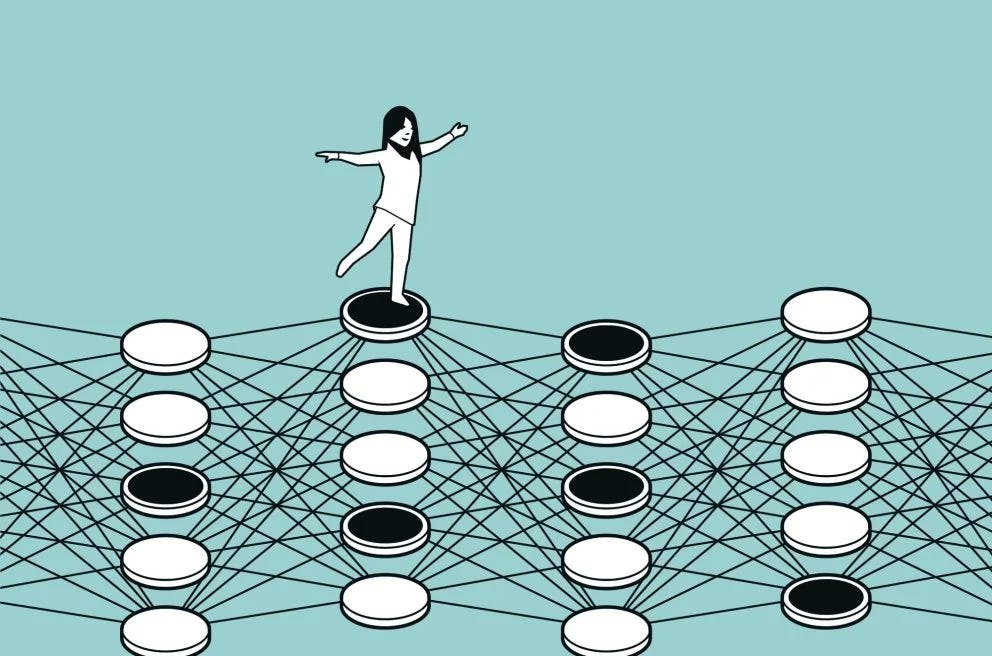A week in Generative AI: Nobel Prizes, State of AI & CyberCab
News for the week ending 14th October 2024
It’s been a quieter week this week, but an incredibly significant one. We’ve had Nobel prizes awarded to AI scientists in both Physics and Chemistry and the release of Air Street Capital’s influential State of AI report for 2024. We also had the launch of Meta AI in more countries and the huge flop that was Tesla’s ‘We, Robot’ event that resulted in the company losing over $60bn in value.
In ethics news there are some great articles on how we can better track the carbon footprint of AI models as well as news that AI itself could help us reduce the energy usage of AI by 95%.
In long reads, we have a blog post from Anthropic’s co-founder Dario Amodei on the future of AI and a great piece from The Wall Street Journal on why Yann LeCun thinks AI is dumber than a cat.
Enjoy!
Nobel prizes for AI pioneers
This week, Nobel 2024 prizes were announced and pioneers of AI technologies were celebrated for their achievements and awarded both the Nobel Prize for Physics and the Nobel Prize for Chemistry.
John Hopfield and Geoffrey Hinton (of ex.Google fame and often referred to as the “godfather of deep learning”) were awarded the Nobel Prize for Physics for their work using physics to find patterns in information.
David Baker, Demis Hassabis (of Theme Park and Google DeepMind fame), and John Jumper were awarded the Nobel Prize for Chemistry for revealing proteins’ secrets through computing and artificial intelligence.
It’s great to see all of this pioneering work with AI being celebrated, but there is also a fear that ‘AI is eating science‘ and many future achievements will be delivered by AI, and not just humans.
We haven’t seen AI win a Nobel Peace Prize yet, but maybe we will in the future?!
The State of AI 2024 Report released
Here’s a great summary of Air Street Capital’s State of AI 2024 report by my favourite AI YouTuber, AI Explained. The annual State of AI reports have been going for 6 years now and they’re a great overview of what’s happened in the last 12 months as well as some predictions of what’s likely to happen in the next 12 months.
The report is a huger 212 page document that covers the research, wider industry trends, politics, and safety of AI systems. Below are some excerpts from the executive summary:
Research
Frontier lab performance converges, but OpenAI maintains its edge following the launch of o1, as planning and reasoning emerge as a major frontier.
Foundation models demonstrate their ability to break out of language as multimodal research drives into mathematics, biology, genomics, the physical sciences, and neuroscience.
Industry
NVIDIA remains the most powerful company in the world, enjoying a stint in the $3T club, while regulators probe the concentrations of power within GenAI.
More established GenAI companies bring in billions of dollars in revenue, while start-ups begin to gain traction in sectors like video and audio generation. Although companies begin to make the journey from model to product, long-term questions around pricing and sustainability remain unresolved.
Politics
While global governance efforts stall, national and regional AI regulation has continued to advance, with controversial legislation passing in the US and EU.
The reality of compute requirements forces Big Tech companies to reckon with real-world physical constraints on scaling and their own emissions targets. Meanwhile, governments’ own attempts to build capacity continue to lag.
Anticipated AI effects on elections, employment and a range of other sensitive areas are yet to be realised at any scale.
Safety
A vibe-shift from safety to acceleration takes place as companies that previously warned us about the pending extinction of humanity need to ramp up enterprise sales and usage of their consumer apps.
Governments around the world emulate the UK in building up state capacity around AI safety, launching institutes and studying critical national infrastructure for potential vulnerabilities.
Every proposed jailbreaking ‘fix’ has failed, but researchers are increasingly concerned with more sophisticated, long-term attacks.
Meta AI launches in 6 countries, including Brazil and the UK
Meta has now launched their AI chatbot, Meta AI, in more countries and plans to add more countries as part of a gradual rollout. Meta AI is available on Facebook, Instagram, WhatsApp, and Messenger and currently has over 500m users globally, driven by a huge amount of usage on WhatsApp in India.
Meta AI is positioned as helping people “learn, create and connect in new ways” and at last month’s Meta Connect event they announced that they’ve added celebrity voices as well as giving Meta AI the ability to understand images and learn more about your surroundings.
Meta AI can also create images, edit images, and turn images into animations. I’m sure similar features will be coming for video in the next few months too, following the announcement of Meta’s Movie Gen last week.
Tesla’s value drops $60bn after investors fail to hail self-driving ‘Cybercab’
Tesla’s ‘We, Robot’ event was such a big disappointment on so many levels.
The most obvious one is that Elon Musk has been promising self driving ‘by the end of next year’ for over 5 years now without delivering, so even hosting an event relying on that promise was a bit of a stretch in the first place.
Then there was the lack of details shared about how they go from their current ‘full self driving’ software (that needs human intervention on average every 13 miles) to a car that doesn’t even have a steering wheel, all in less than a couple of years.
Lastly, there were also reports that the Optimus robots shown off at the event were not autonomous and were being operated by technicians behind the scenes. All in all, not a great look for a company that claims it is an ‘AI company‘ now, and it was unsurprising to see the company’s stock drop so significantly after the event.
AI Ethics News
The AI clip that convinced - and divided - a Baltimore suburb
New algorithm could reduce energy requirements of AI systems by up to 95 percent
OpenAI exec rules out sharing revenue from SearchGPT with publishers, for now
OpenAI pursues public benefit structure to fend off hostile takeovers
Long Reads
Wired - Amazon Dreams of AI Agents That Do the Shopping for You
Dario Amodei - Machines of Loving Grace
The Wall Street Journal - This AI Pioneer Thinks AI Is Dumber Than a Cat
“The future is already here, it’s just not evenly distributed.“
William Gibson









How much will ai play in global conflict especially regarding political figures using ai to create propaganda?